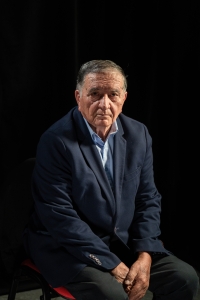Perhaps we were all a little too free, so we thought it could be done that easily

Download image
Dinko Tamarut was born on September 6, 1941 in Stara Novalja, on Pag. His family is from that island. His mother’s last name was Peranić, and she was born in 1906, and his father’s in 1901. In 1952, he finished the last, fourth grade at the school in Stara Novalija. After that, he went to his sister and her husband, a former JNA captain, to Rijeka. There he finished an eight-year school, and then a secondary technical shipbuilding school in 1960. After school, he worked at the Vulkan company in Rijeka. Later, he was employed at the Metis company in the same city. It was one of those firms, which survived the transition, so he is one of the few who kept his job. He has been retired since 2003. In 1969, he became a member of the League of Communists. He is still member of the Social Democratic Party. He became a representative of the Rijeka city council three times in the elections. In the 1990s, due to the finishing of the officer’s course, he became a member of the territorial defense and the Reserve Command of the Croatian Army of the Municipality of Rijeka. He secures the city, the most important locations, key places for the army. Since 2005, he was the president of the Association of Anti-Fascist Fighters and Anti-Fascists of Rijeka, and later he became, and still is, the president of the Association of Anti-Fascist Fighters and Anti-Fascists of the Primorje-Gorski Kotar County. He has a daughter and a grandson.

